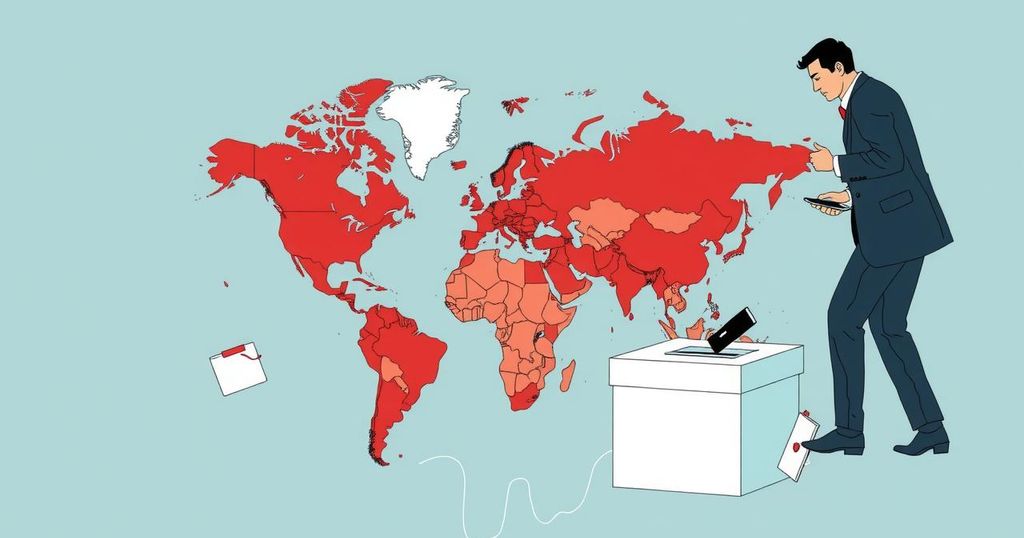Global Elections 2024: A Year of Discontent and Political Transformation

The year 2024 marked a significant backlash against incumbents across around 70 nations as economic distress, political dissatisfaction, and global instability drove voters to reject sitting governments. Key elections resulted in the rise of disruptive figures and far-right parties, revealing a complex interplay between democracy and authoritarianism that continues to shape global politics. Concerns over foreign meddling and disinformation further complicate this democratic landscape.
In 2024, voters across approximately 70 nations voiced discontent with their governments, leading to significant losses for incumbents amid a backdrop of economic hardship and global instability. Major world powers, including India and the United States, experienced what was termed an anti-incumbent movement. This disillusionment resulted from residual impacts of the COVID-19 pandemic, rising inflation, and geopolitical conflicts, notably Russia’s invasion of Ukraine. Noteworthy electoral outcomes included the decline of longstanding governments and the emergence of disruptive political figures, indicating a tumultuous environment for democracy.
Within the context of extensive electoral upheaval, Cas Mudde, an expert on extremism and democracy, characterized the year as exceptionally challenging for existing administrations and democracy as a whole. The voter sentiment pointed to widespread frustration with governing parties, leading to unexpected results in countries such as South Africa, India, and Japan, where unpopular governments faced rejection. The African National Congress, which ruled South Africa for three decades, had to form a coalition after losing substantial support, and in India, Prime Minister Modi’s party lost its majority for the first time in a decade.
The situation was not exclusive to these nations; political turbulence manifested in various forms globally, including mass protests and attempted power grabs. Notable events included the annulling of an election in Romania, martial law declaration in South Korea, and significant losses for ruling parties in Europe. In Britain, the Conservative Party was ousted after 14 years, reflecting a broader trend as smaller parties garnered more attention in a fragmented political landscape.
Simultaneously, the rise of right-wing populism indicated a paradoxical shift where while many traditional incumbents were ousted, authoritarian figures also gained traction. Countries such as France and Germany witnessed challenges from far-right parties, which reshaped the political dynamics. Amid this turmoil, allegations of foreign election meddling and online disinformation campaigns added another layer of complexity, raising concerns about the integrity of democratic processes.
The year 2024 witnessed a significant number of elections across the globe, with half of the world’s population participating in democratic processes. Amid economic turmoil exacerbated by the COVID-19 pandemic and ongoing conflicts, many incumbents faced severe backlash from voters. Key issues such as high inflation, social unrest, and dissatisfaction with political representation emerged as prevalent themes influencing electoral outcomes worldwide. This context set the stage for various countries to experience upheaval in leadership, reflecting broader sentiments about democracy and governance.
The 2024 elections underscored a pivotal moment in global politics, characterized by widespread voter discontent and the displacement of traditional governing parties. Economic challenges and dissatisfaction with political representation fueled an environment ripe for upheaval, marked by the rejection of incumbents from multiple nations. The continued rise of authoritarianism and populism, alongside concerns regarding foreign interference in elections, complicates the future of democratic practices worldwide. As countries navigate this turbulent political landscape, the implications for governance and public trust remain profound.
Original Source: www.seattletimes.com







